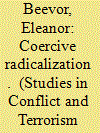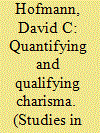|
|
|
Sort Order |
|
|
|
Items / Page
|
|
|
|
|
|
|
| Srl | Item |
| 1 |
ID:
154365


|
|
|
|
|
| Summary/Abstract |
A framework for understanding Islamic State of Iraq and al-Sham (ISIS)'s apocalyptic theology as an internal strategy to “coercively radicalize” its captive subjects is presented, by comparison to the Lord's Resistance Army (LRA), which shares key stages of captive indoctrination with ISIS. A violent experience of “entry,” religious rules learned in an “assimilation” process, and millenarian “grand narratives” framing violence as purification, are examined. These stages construct an image of group leaders as divinely endowed with spiritual knowledge and access (i.e., charismatic authority). This can create a sense of dependency on the leaders and their instructions, potentially motivating violent and altruistic behavior from initially unwilling subjects.
|
|
|
|
|
|
|
|
|
|
|
|
|
|
|
|
| 2 |
ID:
132177


|
|
|
|
|
| Publication |
2014.
|
| Summary/Abstract |
Recent scholarship has called for additional research into the role of charismatic authority in terrorist groups and the process of radicalization. However, the sociological concepts of charisma and charismatic authority are being widely misused in terrorism studies. Current radicalization research often indirectly flirts with core concepts of charismatic authority, but fails to properly tap into its analytical utility. This article proposes to begin addressing this gap in knowledge in three ways, with: (1) a synthesis of social scientific research on charismatic authority, (2) a critical analysis of how charismatic authority is being misused and overlooked in the terrorist radicalization literature, and (3) an exploration of challenges and opportunities for future research concerning charismatic authority and terrorist radicalization.
|
|
|
|
|
|
|
|
|
|
|
|
|
|
|
|
| 3 |
ID:
140779


|
|
|
|
|
| Summary/Abstract |
In the past four decades, there has been increased multidisciplinary scholarly interest in the study of charismatic authority. However, there has yet to be any systematic examination of charismatic authority in the context of terrorism, despite widespread acknowledgment of the importance of charismatic leaders in the recruitment, radicalization, and operation of terrorist groups. This article seeks to contribute to future empirical research by presenting a theoretical framework for measuring the presence of charismatic authority in terrorist groups that is based on Max Weber's seminal work on legitimate domination (herrschaft) and on theoretical insights drawn from the study of charismatic authority in new religious movements. The framework is then applied to an illustrative case study of the relationship between charismatic authority and the radicalization process within the far-right terrorist group “the Covenant, the Sword, and the Arm of the Lord.” The article concludes with a discussion of findings and suggestions for future research.
|
|
|
|
|
|
|
|
|
|
|
|
|
|
|
|
| 4 |
ID:
176997


|
|
|
|
|
| Summary/Abstract |
Although involved in the age of globalisation,1 China has become more centralised. After the decentralisation from 1978 to 1993, the trend of centralisation2 has been once again strengthened since 1994, which was called re-centralisation by some scholars. Many scholars only focus on the period since the 18th CPC National Congress in 2012, but they fail to find out the root cause for re-centralisation. They ignore the fact that the 1994 Tax-sharing System Reform is an important sign of China’s re-centralisation, the answer may lie in it. In this article, we analyse the 1994 Tax-Sharing System from the perspective of Weber’s theory of domination and find out that the anxiety of the new Chinese central government in the early 1990s was the motivation for both tax reform and re-centralisation. At that time, the new central government could rely on none of Weber’s types of legitimate authority to maintain efficient operations because the charismatic authority3 of central leaders had weakened since the era of Deng Xiaoping, and the new type of authority had not been established. In these circumstances, the central government was eager to reshape the authority to stabilise the centralised order, which was also the basic motivation for Tax-Sharing System Reform.
|
|
|
|
|
|
|
|
|
|
|
|
|
|
|
|
|
|
|
|
|